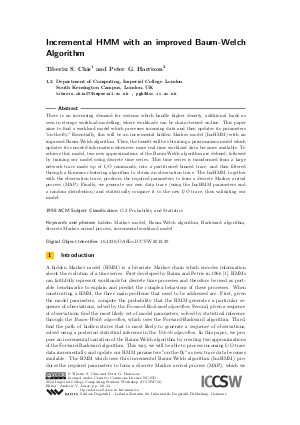Incremental HMM with an improved Baum-Welch Algorithm
Authors Tiberiu S. Chis, Peter G. Harrison
-
Part of:
Volume:
2012 Imperial College Computing Student Workshop (ICCSW 2012)
Part of: Series: Open Access Series in Informatics (OASIcs) - License:
 Creative Commons Attribution-NonCommercial-NoDerivs 3.0 Unported license
Creative Commons Attribution-NonCommercial-NoDerivs 3.0 Unported license
- Publication Date: 2012-11-09
File

PDF
OASIcs.ICCSW.2012.29.pdf
- Filesize: 0.53 MB
- 6 pages
Document Identifiers
Subject Classification
Keywords
- hidden Markov model
- Baum-Welch algorithm
- Backward algorithm
- discrete Markov arrival process
- incremental workload model
Metrics
- Access Statistics
-
Total Accesses (updated on a weekly basis)
0PDF Downloads0Metadata Views
Abstract
There is an increasing demand for systems which handle higher density, additional loads as seen in storage workload modelling, where workloads can be characterized on-line. This paper aims to find a workload model which processes incoming data and then updates its parameters "on-the-fly." Essentially, this will be an incremental hidden Markov model (IncHMM) with an improved Baum-Welch algorithm. Thus, the benefit will be obtaining a parsimonious model which updates its encoded information whenever more real time workload data becomes available. To achieve this model, two new approximations of the Baum-Welch algorithm are defined, followed by training our model using discrete time series. This time series is transformed from a large network trace made up of I/O commands, into a partitioned binned trace, and then filtered through a K-means clustering algorithm to obtain an observation trace. The IncHMM, together with the observation trace, produces the required parameters to form a discrete Markov arrival process (MAP). Finally, we generate our own data trace (using the IncHMM parameters and a random distribution) and statistically compare it to the raw I/O trace, thus validating our model.
Cite As Get BibTex
Tiberiu S. Chis and Peter G. Harrison. Incremental HMM with an improved Baum-Welch Algorithm. In 2012 Imperial College Computing Student Workshop. Open Access Series in Informatics (OASIcs), Volume 28, pp. 29-34, Schloss Dagstuhl – Leibniz-Zentrum für Informatik (2012)
https://doi.org/10.4230/OASIcs.ICCSW.2012.29
BibTex
@InProceedings{chis_et_al:OASIcs.ICCSW.2012.29,
author = {Chis, Tiberiu S. and Harrison, Peter G.},
title = {{Incremental HMM with an improved Baum-Welch Algorithm}},
booktitle = {2012 Imperial College Computing Student Workshop},
pages = {29--34},
series = {Open Access Series in Informatics (OASIcs)},
ISBN = {978-3-939897-48-4},
ISSN = {2190-6807},
year = {2012},
volume = {28},
editor = {Jones, Andrew V.},
publisher = {Schloss Dagstuhl -- Leibniz-Zentrum f{\"u}r Informatik},
address = {Dagstuhl, Germany},
URL = {https://drops.dagstuhl.de/entities/document/10.4230/OASIcs.ICCSW.2012.29},
URN = {urn:nbn:de:0030-drops-37613},
doi = {10.4230/OASIcs.ICCSW.2012.29},
annote = {Keywords: hidden Markov model, Baum-Welch algorithm, Backward algorithm, discrete Markov arrival process, incremental workload model}
}
